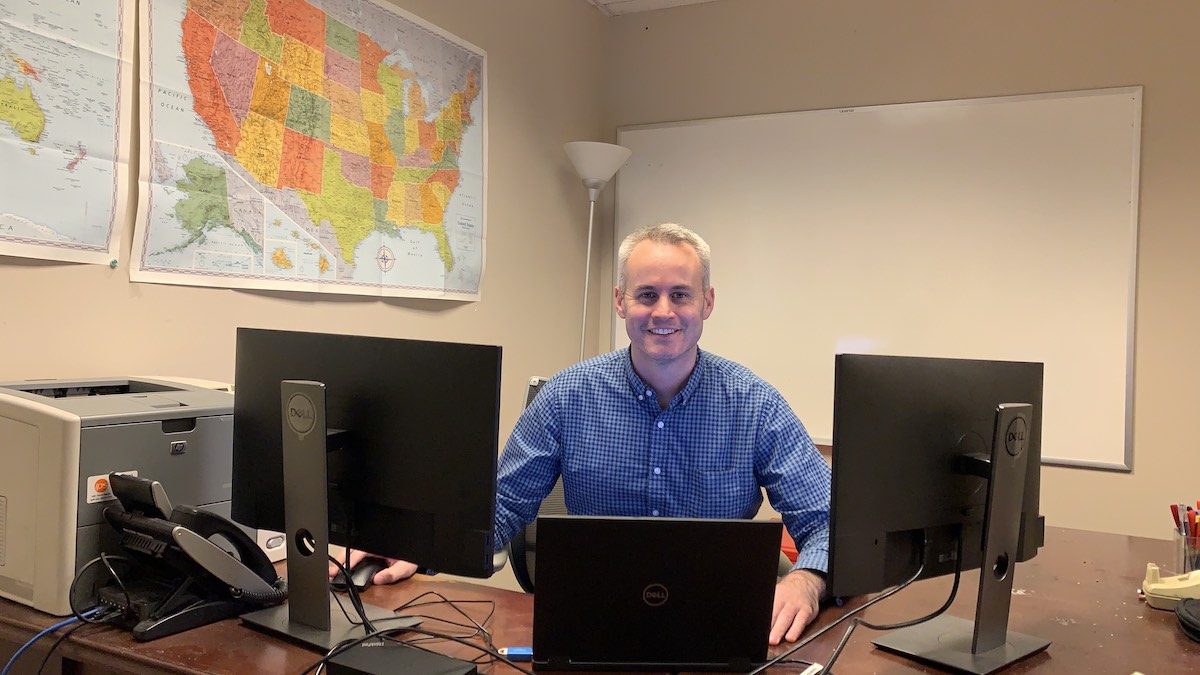After 10 years of teaching high school statistics, John Fitzgibbons found himself on the other side of the classroom as a student in Temple University’s Professional Science Master’s (PSM) in Geospatial Data Science (GDS) program.
Fitzgibbons decided to make a career switch in 2019, just after getting married with a child on the way — and unknowingly heading into the COVID-19 pandemic.
“It was a very scary decision and a particularly scary time for a change,” Fitzgibbons said. “I didn’t know how long it was going to take to find a position after the program. I didn’t know what was going to come out of it. Looking back, I could not be happier with the support that I’ve received from home and at Temple because I just really love what I do.”
Fitzgibbons received a graduate certificate in geospatial information systems (GIS) at Temple in 2020. Then, he transitioned into the PSM in GDS program.
Shortly after graduating in 2021, he was hired as a data visualization associate for the City of Philadelphia’s Office of Children and Families. Like Fitzgibbons, about 96% of Temple’s PSM in GIS and GDS alumni secured jobs in the GDS or data science field upon completion of the one-year program, according to Liz Janczewski, the program’s student services coordinator.
The program officially launched in late 2019. Lee Hachadoorian, the assistant director of the PSM in GIS and GDS programs, said Temple observed a need for programming and statistical analysis skills in the industry.
“We were aware that there was demand in the workforce from people working in the geospatial realm, so we started paying attention to it,” Hachadoorian said. “We thought that it would be really important to emphasize these skills and move forward on putting together a program while thinking carefully about how to differentiate GDS and GIS.”
Since so much data has a spatial element, graduates of the GDS and GIS programs can apply their skills to any industry, Hachadoorian said. GDS differs, however, with its focus on big data and advanced statistical education.

On Temple’s campus. (Photo via facebook.com/templeu)
A combined interest in social issues and the “hard skills” inherent to GDS drew Stephen Francisco, a 2022 PSM in GDS alumni, to the program.
“A lot of my peers who also went to a liberal arts college have the same gap that I felt. They really enjoyed learning and got passionate about the topic, but then their hard skill is doing research, reading and papers, which is what a lot of people have,” said Francisco, who earned an urban studies degree from Hobart and William Smith Colleges. “I just wanted a more specific skill in an industry that was growing. This program definitely fits that category.”
Three-quarters of the way through the program, Francisco was hired as a data analyst for the Urban Health Collective at Drexel University.
Concurrently working in the field full time and completing a master’s program can be draining, Francisco said, but the class schedule allows him to balance both. By design, all classes begin at or after 5:30 p.m. so students can maintain jobs and other opportunities.
The jobs are out there. If you skill up this way, you're going to be able to find something where you're going to be able to use it.
Fitzgibbons did run into one scheduling hiccup along the way — one that Hachadoorian quickly remedied. A class that Fitzgibbons needed to finish the program wasn’t available, and he was worried about delaying graduation another semester. To help, Hachadoorian offered to teach Fitzgibbons the class as an independent study during his lunch hour.
“Every professor is just so helpful and so knowledgeable on what we can do with this type of technology,” Fitzgibbons said. “It can do so much to benefit public policy, public health, and education. They truly see how this can bring awareness to whatever issues we see societally.”
“It could just be building an app to really show ‘Hey, here’s what’s going on in Philadelphia, a city that’s impacted so much by violence or by poverty,’ and then hopefully getting it in the hands of the right people who can start making a difference,” he said.
Hachadoorian is excited about not just the PSM in GDS program’s job retention rates. The assistant director is also excited about the work Temple’s alumni have taken on, such as jobs at city and state agencies, engineering firms, geotech firms and nonprofits.
“I’m so proud of our alumni, and the truth is there is space for more growth,” Hachadoorian said. “The benefit is, if this stuff interests you, the jobs are out there. If you skill up this way, you’re going to be able to find something where you’re going to be able to use it.”
Learn more about Temple’s PSM in GDS program
This article is sponsored by Temple University and was reviewed before publication.
Join our growing Slack community
Join 5,000 tech professionals and entrepreneurs in our community Slack today!
Donate to the Journalism Fund
Your support powers our independent journalism. Unlike most business-media outlets, we don’t have a paywall. Instead, we count on your personal and organizational contributions.

National AI safety group and CHIPS for America at risk with latest Trump administration firings

Immigration-focused AI chatbot wins $2,500 from Temple University to go from idea to action

How women can succeed in male-dominated trades like robotics, according to one worker who’s done it


